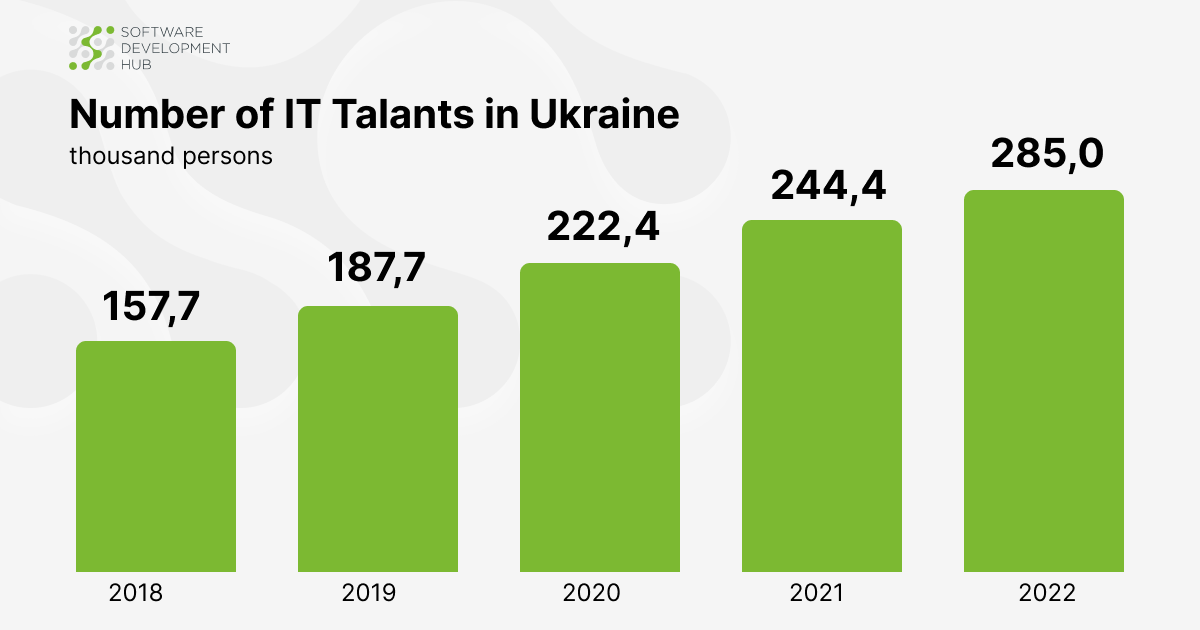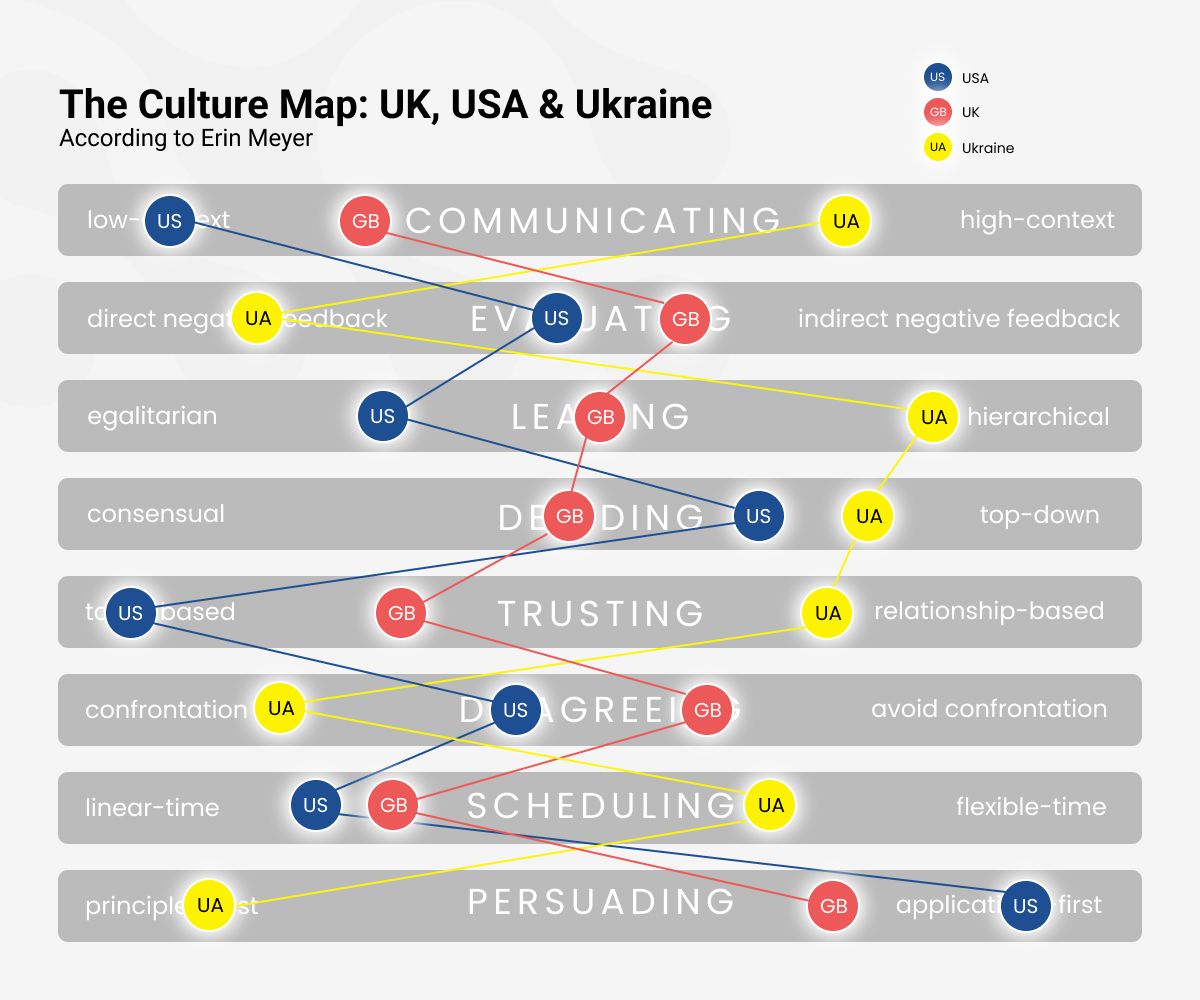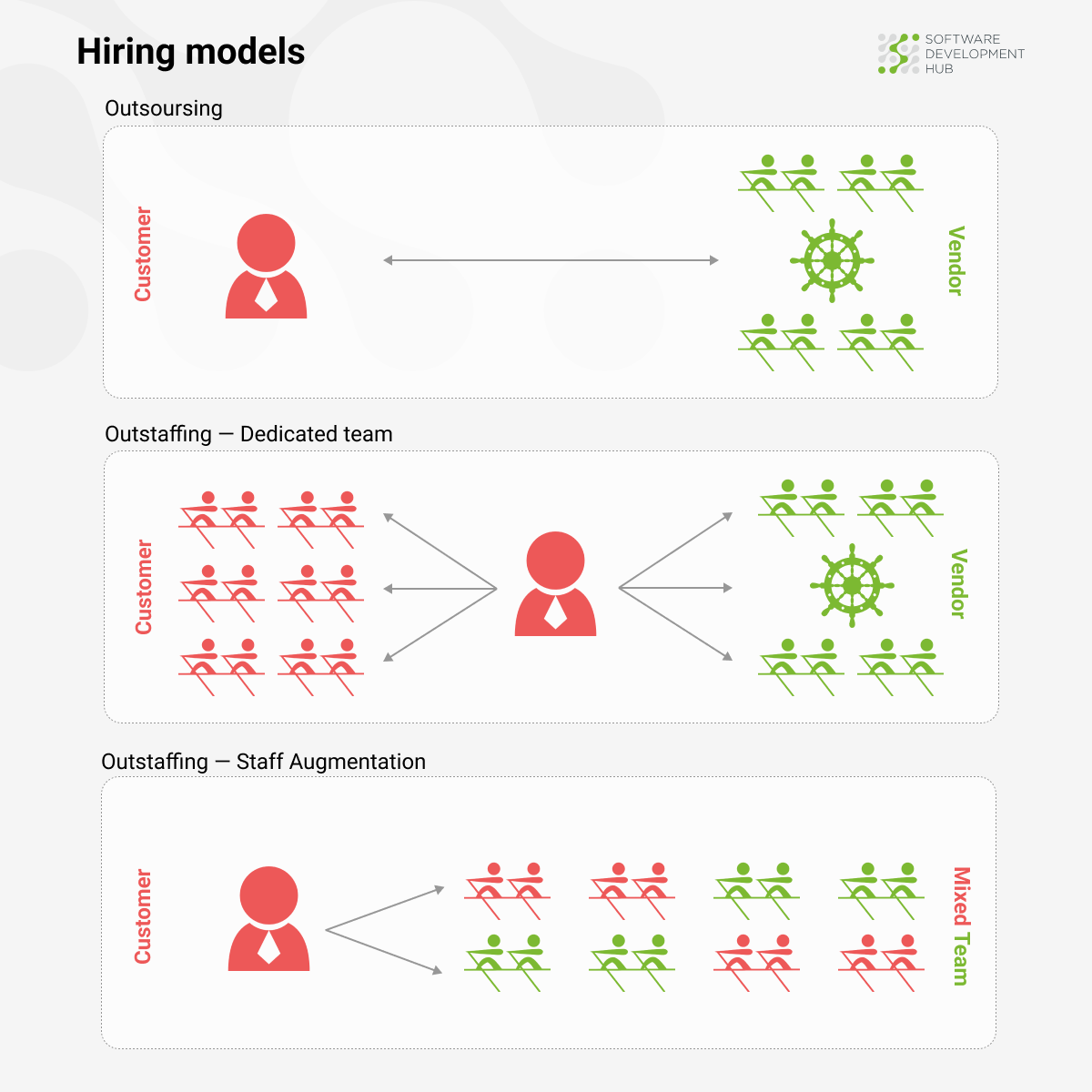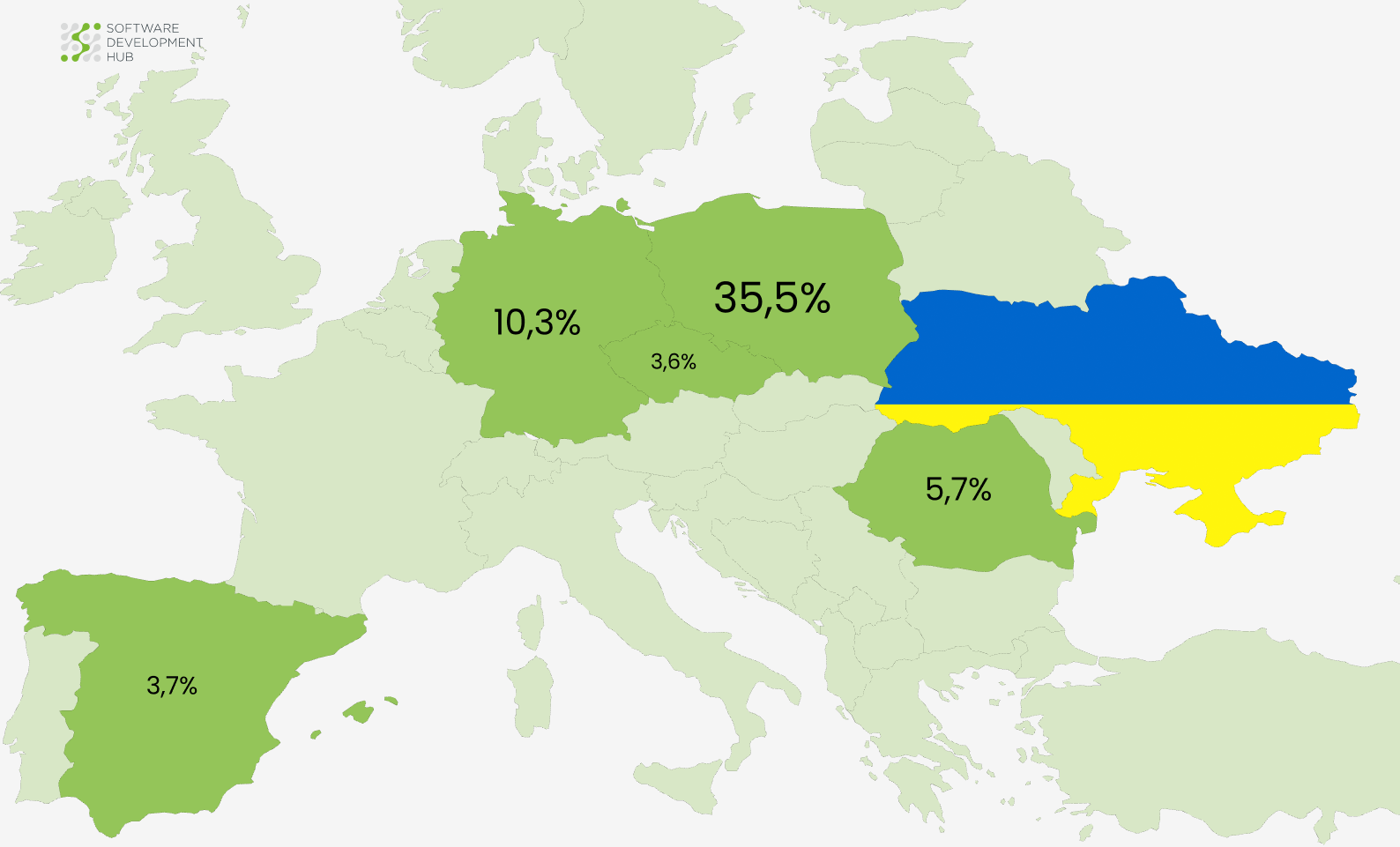IT Outsourcing in Ukraine and Wartime
Until February 2022, Ukraine was one of the leading destinations for IT outsourcing.
To better understand where the Ukrainian IT market is now and what to expect, Alla Kovshova, the marketing manager at Software Development Hub, analyzed how it has changed during the war and predicts what this means for companies requiring qualified offshore software specialists.
Ukraine Software Outsourcing: Facts & Figures
As of early 2022, Ukraine, with more than 285,000 software engineers, was considered one of the world's most attractive IT development hubs. Competitive cost, loyal taxation, a huge pool of highly qualified personnel, convenient location, and cultural affinity made Ukraine one of the best places in Europe to set up a research and development center.
In pre-war times, the Ukrainian IT market was showing rapid growth: in 2021, exports of IT services grew by 36% from $5 billion to $6.8 billion. Over the past three years, the industry has doubled its exports and increased the number of specialists by more than 50%, and this trend continues.
North America and Western Europe remain the essential target regions for Ukrainian IT services companies.
IT outsourcing providers account for the largest share (70%) of the Ukrainian IT market.

According to the National Bank of Ukraine, the volume of computer services exports in the first half of 2022 amounted to $3.74 billion, which is 23% more than during the same period of the previous year. Thus, since the beginning of 2022, despite the war, the IT industry has continued to show steady growth.
Today, the industry actively donates funds to the Ukrainian Armed Forces and various humanitarian projects, it pays taxes on time, and maintains its position in the international market.
- According to Gartner, Ukraine is among EMEA's top 20 offshoring destinations.
- According to WIPO, Ukraine ranks 49th among the most innovative countries in the Global Innovation Index 2021.
- According to Emerging Europe's IT Competitiveness Index, Ukraine ranks highly on its IT Opportunity Index.
So why is Ukraine still the right place if you are interested in hiring a specialized web development team or building an application development team?
Talents
The portrait of typical Ukrainian IT workers is as follows: they have higher (often technical) education, at least secondary knowledge of English, and work experience of 2 years or more.
Ukrainian software developers are ranked top-high worldwide in both HackerRank and SkillValue challenges. For comparison, Ukrainian developers performed 8.58% and 13.62% better than their American and Israeli counterparts.
The significant demand for Ukrainian talent is due to the high educational level of Ukrainians. According to the UN education index, Ukraine ranks 47th out of 189 (between the UAE and Italy). Ukraine's education index generally corresponds to the level of foreign countries.
Due to the development of the IT sector, job prospects, and relatively high salaries in Ukraine, STEM education is becoming increasingly popular. Moreover, in cooperation with IT clusters, local IT companies have put a lot of effort into updating university programs for engineering students. They have improved master's programs in various fields such as data science, machine learning, AI, IoT, and more.
Ukraine has a solid scientific base and an extensive network of publicly funded technical universities. Among them are Igor Sikorsky Kyiv Polytechnic Institute, National Aviation University, State University of Telecommunications, Lviv Polytechnic National University, Kharkiv National University of Radio Electronics, Kharkiv Polytechnic Institute, Dnipro University of Technology, Zaporizhzhia Polytechnic National University, Odesa Polytechnic National University, Vinnytsia National Technical University, etc.
More than 150 universities offer bachelor's degree programs in IT, with at least 16,000 bachelors graduating annually.
The most popular technical fields are Computer Science, Computer Engineering, Software Engineering, Сomputer-Integrated technology, and Cybersecurity.
Programming Languages & Technologies
Ukrainian software developers specialize in various programming languages, technologies, and tools. They are ranked 5th in TopCoder's list of the best programmers and often top different programming skill rankings.
JavaScript is Ukraine's most popular programming language, followed by C#, Java, Python, and PHP.
There is a strong stereotype among Ukrainians that the primary motivation for working in the technology industry is a high salary. However, many studies dot the i's and cross the t's — the financial outlook is not the most important reason to choose the profession. 78% say interest in technology was the principal reason for building a career in the field.
The distinctive feature of the young generation of specialists in the market is a rather narrow profile compared with programmers of the older generation, who have large-scale systemic thinking and strong engineering skills. This is a consequence of the global simplification of development technology for specialists. It has lowered the "threshold" of entry into the profession.
Work Ethic & Cultural Compatibility
Due to the significant difference in salaries between junior and senior-level specialists, Ukrainian developers are highly motivated to get promoted more quickly and, therefore, to work diligently.
They also tend to rely on precise requirements and detailed planning, regardless of development methods (Agile or Waterfall). This is facilitated by a project management culture that has evolved over the years, which puts work processes in a rigorous framework.
Regarding cross-cultural communication, Ukrainian developers are generally straightforward, communicative, open-minded, and share Western culture and values. Erin Meyer's diagram shows the differences in cultures compared to American and the British:
- Communicating: explicit vs. implicit
- Evaluating: direct negative feedback vs. indirect negative feedback
- Persuading: deductive vs. inductive
- Leading: egalitarian vs. hierarchical
- Deciding: consensual vs. top down
- Trusting: task vs. relationship
- Disagreeing: confrontational vs. avoid confrontation
- Scheduling: structured vs. flexible

The war has intensified the trends of Ukraine's shift to a Western business culture of behavior, although the political "authoritarian" past is still quite pronounced in industrial and perennial businesses.
The higher the seniority of a developer, the better he/she speaks English. Therefore, companies with a higher level of seniority are a guarantee for successful product delivery. In addition, each project requires an experienced project manager, fluent in English, who can build a communication strategy and ensure that the project is completed without misunderstanding on the developer's part.
Geography
Foreign companies and investors outsource their software development projects to Ukraine due to its geographical location and reasonable prices.
Ukraine’s time zone has a one or two-hour difference from European countries. For comparison, a startup from London working with a software development agency in Ukraine has a 2-hour difference. Ukraine's time zone makes it very convenient for near-shoring, as it guarantees smooth workflow and communication between disparate teams.
Ukraine is also well-suited as a preferred offshore option for US startups. The 7-hour time zone difference between the East Coast and Ukraine provides more convenient joint working hours compared to, for instance, the Philippines (12 hours) or India (9 hours).
The war has significantly adjusted all our plans and ideas for the near future. Within two weeks, we relocated highly qualified software developers and their families from the east to safer regions. European integration and anti-Russian processes have brought Ukrainian IT business to a completely new level of interaction with existing and potential business partners and customers.
— Vasyl Kuchma, Managing Partner at Software Development Hub.
Salary
A huge number of qualified specialists means that when you outsource IT to Ukraine, you get a competitive level of service at an affordable hourly rate, which in Ukraine is $35-50.
According to the specialized recruiting portal Djinni, in October 2022, there were 64,000 candidates and only 16,000 vacancies on the site. Such disproportion indicates that many developers lost their jobs due to the war, which also caused a decrease in salary expectations. Programmers have now agreed to a salary of $26,400/year.
For customers, this is a favorable state of affairs.
Below you can see the average hourly rates of Ukrainian specialists:
- Software Developers:
Junior: $25-$30
Middle: $30-$45
Senior: $50-$70 - UI/UX Designers: $30-$60
- Project Managers: $40-$70
- Quality Assurance Engineers: $25-$35
- DevOps Engineers: $40-$70
For comparison, here are the average hourly rates for developers in several countries and regions:
- North America: $100-$150
- Western Europe: $60-$90
- Eastern Europe: $35-$55
- Canada: $80-$120
- Australia: $70-$110
But there is always a choice between hiring an individual contractor or working with an IT service provider. At first glance, working directly with a freelancer may be more cost-effective. However, managing individual contractors requires more effort and doesn't support scalability. With collective expertise and in-depth knowledge, outsourcing companies can ensure overall project success and provide the ability to expand the team to support the rapid growth of your business.
Types of Contracts & Pricing Models
Ukraine is widely known for its outsourcing services, offering various variants of popular cooperation models (outsourcing and co-sourcing) and remuneration formats (FP, FFF, T&M).
- Full process outsourcing, managed projects — the Ukrainian partner undertakes the whole development process with full responsibility for the organization and management, the quality of the results, and the risks involved, from business analysis to solution support.
- Dedicated team — the client gets a group of Ukrainian IT professionals selected to meet the requirements and specifics of the task on a long-term basis. The dedicated team can replace the entire staff of developers or work side-by-side with the internal department, provided there is a clear delineation of responsibilities. The management remains on the vendor's side.
- Staff augmentation — the partner provides you with individual specialists so that you can staff the team yourself. The specialists provided integrate with your employees or those from another vendor.

Many companies also considered establishing their own R & D offices in Ukraine, which opened more opportunities for company growth and complete control over software development. Today, the R & D office format has many risks, and crisis advisers recommend resorting to this cooperation option when peace returns to Ukraine.
Ukrainian developers also offer different variants of remuneration:
Fixed-Price
Before signing the contract, you pay a predetermined price based on the developer's labor estimate. If the task is simple and small, and there is a clear vision of the result, then the model is acceptable.
FFF: Fixed Price, Fixed Time, Flex Scope
Often a business needs to prescribe a deadline and budget in a contract, but there are no strict volume requirements. In this case, you can change the volume for the sake of the overall quality of the product; that is, you can exclude the least priority parts of the functionality from the release to meet the deadline and budget without compromising the quality of the code.
Time & Materials
You pay for the hours worked. This format is the most common when working with Ukrainians. It is suitable for working in a highly uncertain environment where the amount of labor is often determined on the fly, and the team size can vary throughout the project.
Taxes & Government Support for the IT Market
In recent years the Ukrainian government has implemented economic, and tax reforms encouraging companies around the world to outsource their IT needs to Ukraine or to open their own R & D centers.
According to Stackoverflow research, 17.5% of Ukrainian software developers are individual contractors, freelancers, or self-employed.
The Ukrainian tax system provides comfortable conditions for the IT business, which ensures sustainable development of this sector year after year. In addition, a special legal and tax model of Diia City started to work in 2022, allowing Ukrainian IT to work with a reduced tax system.
Standard tax regime:
- The single tax model is typical for the IT industry (hiring specialists as independent contractors — individual entrepreneurs "FOP").
- 5% of the income of an IT specialist or 3% if the IT specialist is registered as a VAT payer.
- 18% personal income tax.
- 1.5% military tax.
The minimum single social contribution was about $50 per month in 2022.
2. Hiring model:
- 18% personal income tax.
- 1.5% military tax.
- 22% of the tax base for the UST is limited to 15 minimum wages per month.
Diia City special tax regime:
- Personal taxation for IT professionals
- Corporate taxation
- 9% so-called tax on distributed profits.
- Business profits are taxed only when they are withdrawn from the business. This makes it possible to apply a 0% personal income tax rate to dividends that have not been distributed for two years or more;
- or 18% corporate income tax (regular income tax system).
- 5% income tax rate for IT professionals;
- 1.5% military tax.
Despite the war of restrictions, offshore developers from Ukraine have not stopped their work process. They are even making it as comfortable as possible for customers by offering them the best quality-price ratio.
Forced War-Migration
Ukraine's most powerful educational centers have formed clusters of companies in their regions and local communities.
In terms of talent dislocation, before the war, there were three Ukrainian cities with the highest number of software developers — Kyiv (42%), Lviv (15%), and Kharkiv (12%), accounting for 69% of all IT professionals in the country. In 2021 in Kyiv and the Kyiv region, there were about 99,200 IT specialists. The Kharkiv region was in second place, with 40,800 specialists living there.
After the Russian invasion, 61% of Ukrainian IT professionals left their homes and changed their city of residence. Many moved to western Ukraine, to cities such as Lviv, Ivano-Frankivsk, Uzhgorod, Khmelnytskyi, Chernihiv, Ternopil, and Rivne.
14% (42,000) went abroad, portal dou.ua reports. The top five countries where Ukrainian IT specialists moved to are:
- Poland 35.2%;
- Germany 10.3%;
- Romania 5.7%;
- Spain 3.7%;
- Czech Republic 3.6%.

Because of the COVID-19 restrictions, many companies already had the experience of working remotely. Therefore, they could quickly restructure their work under war conditions without losing productivity. While bombarded, Ukrainian programmers are ready to work hard and fulfill their obligations. The war has clearly demonstrated the courage and motivation of the Ukrainian people.
On February 24, Kharkiv took the first hits from enemy missiles. Despite the roar of sirens, constant stress, and evacuation, our Kharkiv engineers continued to do their work. Within two weeks, we relocated the office. Thanks to well-coordinated logistics and advance preparation, we avoided losses and downtime. None of the projects were affected, and all releases took place on time and to a high standard.
— Vic Bukhatsov, CEO at Software Development Hub.
Advantages of Outsourcing IT Projects in Ukraine
Over 61% of Ukrainian IT professionals had to leave their home cities and move to other locations. 14% of them went abroad, which is over 42,000 people.
Despite the war, supply, and energy crises, existing foreign partners in IT outsourcing demonstrate their support for Ukrainian developers. Ukrainian software development specialists are valued for their strong technical background, motivation, and engineering mindset.
Along with the most popular coding languages, such as Java, C#, Python, etc., Ukraine has plenty of specialists who know rare and new technologies, including C++, Scala, C, Dart, Delphi, etc. As for soft skills, Ukrainian IT specialists quickly adapt and improve in such areas as communication, strategic thinking, and project management.
The average cost of software developers in Ukraine ranges from $40 to $60 per hour. Creating an offshore development team in Ukraine is much cheaper than in the US — without compromising the quality of the code. That is why IT companies in the USA prefer outsourcing in Ukraine, as it is difficult to find such an ideal price/quality ratio in the local market.
Categories
Share
Need a project estimate?
Drop us a line, and we provide you with a qualified consultation.







